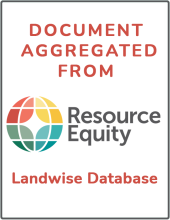Land Library Search
Through our robust search engine, you can search for any item of the over 73,000 highly curated resources in the Land Library.
If you would like to find an overview of what is possible, feel free to peruse the Search Guide.
/ library resources
Showing items 1 through 9 of 149.Agricultural growth will prove essential for improving the welfare of the vast majority of Africa’s poor. Roughly 80 percent of the continent’s poor live in rural areas, and even those who do not will depend heavily on increasing agricultural productivity to lift them out of poverty.
This document summarises the proceedings from a conference organised by International Institute for Environment and Development (IIED) , Natural Resource insitute (NRI) and the Royal African Society in November 2004.The conference brought together a wide range of interest groups including, Africa
An AFRA documentary from 2004 that looked at the conditions that looked at the conditions that farm dwellers lived in and how little has changed.
Globally, the conservation and tourism sector is being enthusiastically promoted as one of the key mechanisms to catalyze rural local economic development.
This paper discusses issues surrounding indigenous land rights, sharing an understanding and information about land tenure and titling within Latin America.
This national Policy for the water sector in Cambodia sets out a vision, fundamental principles, current situation and policies regarding development and management of freshwater resources and water demand and supply in Cambodia.
This document summarises the proceedings from a conference organised by International Institute for Environment and Development (IIED) , Natural Resource insitute (NRI) and the Royal African Society in November 2004.The conference brought together a wide range of interest groups including, Africa
What are the links between HIV/AIDS and women's property rights in Sub-Saharan Africa (SSA)? This paper asks if women's lack of rights increases household poverty and their own vulnerability to infection, and if securing these rights can reduce the impacts of the epidemic on poverty.





